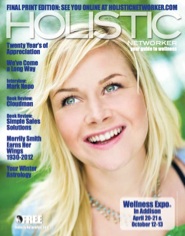 Would you like to sleep like a baby without taking drugs? Americans spend upwards of 3 billion dollars a year on sleep medications, but to avoid the side effects, there are a number of natural remedies you can try first. In my new book, Second Spring: Dr. Mao’s Hundreds of Natural Secrets for Women to Revitalize and Regenerate at Any Age, I offer many natural ways to address hormonal imbalance and lift mood so that you can have a soothing sleep, some of which I’ll share with you here.
Would you like to sleep like a baby without taking drugs? Americans spend upwards of 3 billion dollars a year on sleep medications, but to avoid the side effects, there are a number of natural remedies you can try first. In my new book, Second Spring: Dr. Mao’s Hundreds of Natural Secrets for Women to Revitalize and Regenerate at Any Age, I offer many natural ways to address hormonal imbalance and lift mood so that you can have a soothing sleep, some of which I’ll share with you here.
The causes of insomnia are many, but if you are a woman in pre-menopause, menopause or post-menopause, you may find that your shifting hormones leave you tossing and turning at night. A drop in estrogen combined with fluctuating levels of neurotransmitters like dopamine and serotonin can make you anxious all day and keep you awake at night. The key to restoring your system’s balance is to support the nerve functions that produce and release the neurochemicals that are responsible for states of bliss and tranquility, like endorphin, dopamine, and oxytocin.
From a Chinese medical perspective, we have long recognized that health is the result of the body in equilibrium or balance of yin and yang, the two opposite yet complementary functions. In the case of insomnia, the female essence, or yin, has slowly become depleted during menopause. Yin is a calming essence needed to balance the fiery yang of the nervous system, so when you are low on yin one major symptom is insomnia, manifested as difficulty falling asleep or episodes of waking up late at night and being unable to sleep again. Hot flashes, night sweats, irritability, and agitation are all related to this root condition. A calming tea before bedtime can ensure a good night’s sleep. Look for one with the traditional Chinese herbs zizyphus or jujube seed, bamboo shavings, and oyster shell, which soothe the mind and spirit. Another therapeutic tea that treats insomnia is passiflora or passion flower, a recognized sedative that improves mood and promotes restful sleep. Simply steep 1 to 2 tablespoons of the dried herb in one cup of hot water and drink just before bed.
Another natural sleep aid is the supplement 5-HTP, derived from an African plant, which converts to serotonin in the brain and has a tranquilizing effect. The recommended dosage is to take 200 mg at night.
Many relaxing rituals before bedtime will have you resting easy. First, indulge your sense of smell. Research has found that lavender, vanilla, and green apple are among the best scents to help lower anxiety and induce sleep. Try applying the essential oils of these scents to the inside of your wrist or indulge in a warm bath with these oils dissolved in the water. Also, you might enjoy a glass of hot milk with natural vanilla flavoring for a calming effect inside and out.
A technique that works for the majority of my insomniac patients is meditation—especially the Stress Release Meditation: Breathe consciously, relax, and with each exhale focus on relaxing each area of your body in sequence, starting from the top of your head and moving down to your toes.
Finally, acupressure is a wonderful self-healing technique that anyone can perform. One acupressure point that you can use to bring deep, calming sleep is called “Inner Gate.” To locate it, line up your index, middle, and ring fingers on the opposite arm so that your ring finger touches the crease on the inside of your wrist. The index finger is now touching the point, right between the two tendons on the inner arm. Now use your thumb to press down on that point for 30 seconds, let go for five, and continue this sequence for five minutes, breathing deeply. Repeat on the other side.
Dr. Maoshing Ni, popularly known as Dr. Mao, is a thirty-eighth generation doctor of Traditional Chinese medicine and an authority in the field of Anti-Aging Medicine. He is the cofounder of Tao of Wellness, the premier Chinese medicine center in Southern California. His new book, “Second Spring: Dr. Mao’s Hundreds of Natural Secrets for Women to Revitalize and Regenerate at Any Age,” is on sale from Free Press April 7, 2009. Visit him online at AskDrMao.com
About Tony Cecala
Tony is a business strategist. He publishes the Holistic Networker and produces the Wellness Expo. In his spare time he reads about technology and the mind.
- Web |
- Flickr |
- More Posts(165)










